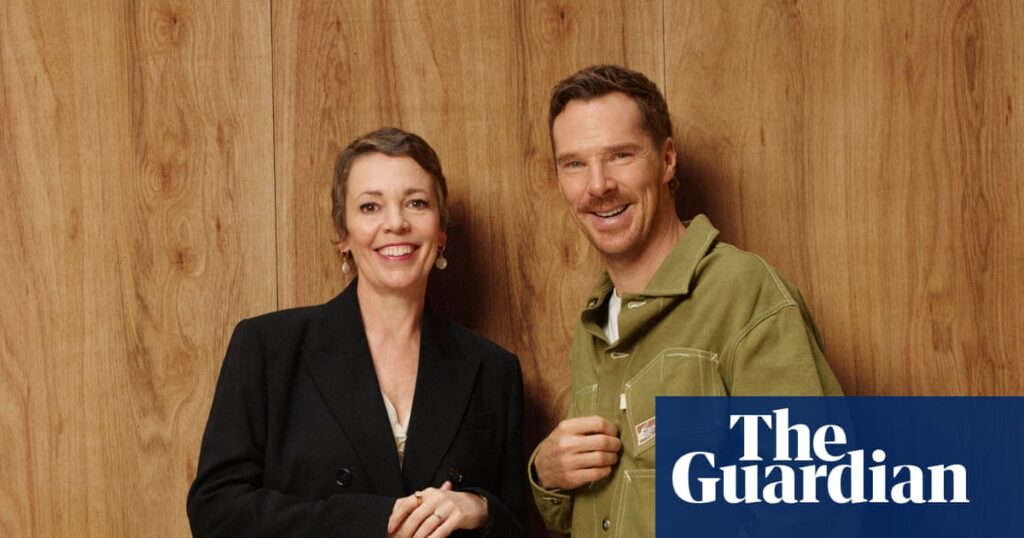
At the start of the film The Roses, a couple is asked to list what they love about each other during a counseling session. It’s a struggle, with one partner barely able to muster, “He has arms.” However, the actors portraying them, Benedict Cumberbatch and Olivia Colman, are far more forthcoming. Before the question is even posed, Colman praises Cumberbatch’s hairstyle, while he admires her suit. This playful banter sets the stage for a deeper discussion on love and marriage, both on-screen and off.
The two actors, who have known each other for years, share a candid conversation about the intricacies of relationships. Cumberbatch admits, “I hate how predictable I am around Olivia, and I hate what a grumpy arsehole I feel in the face of her unmitigated joy.” Colman, in turn, expresses admiration for Cumberbatch’s raw talent and intuition. Their rapport is a testament to their long-standing friendship and mutual respect.
The Roses: A Modern Take on Marriage
The Roses, a film adaptation of Warren Adler’s 1981 novel The War of the Roses, explores the complexities of modern marriage. In the film, Ivy (played by Colman) and Theo (Cumberbatch) relocate from London to California, where their careers take divergent paths. Ivy’s career as a chef flourishes, while Theo’s as an architect falters. This dynamic creates tension as they navigate their roles within the marriage.
The screenplay, penned by Tony McNamara, suggests that capitalism and career fulfillment have become integral to marriage. “Both partners have to work,” McNamara explains, “Balancing that with a partner, children, and a mortgage is ridiculous.” This sentiment reflects the broader societal pressures faced by modern couples.
Gender Roles and Relationship Dynamics
The film also delves into gender roles, with Ivy and Theo’s relationship serving as a lens to examine these evolving dynamics. McNamara notes that both characters struggle with their egos and the expectations placed upon them. “When she got the chance, her ego was as big as his,” he says of Ivy, highlighting the challenges of balancing personal ambition with partnership.
Colman and Cumberbatch discuss these themes, with Colman asserting, “It’s not about genders, it’s about roles at home. It could be a same-sex couple.” This perspective underscores the universality of the film’s message, transcending traditional gender norms.
Insights from the Cast and Crew
Director Jay Roach, known for his comedic films, approaches The Roses with an interest in what makes relationships work or fail. He describes the film as a reflection on the special relationship between the US and UK, with Ivy and Theo’s British wit contrasting with the frankness of their American friends.
Cumberbatch and Colman, both popular in the US, reflect on their experiences across the Atlantic. Cumberbatch appreciates the freedom to evolve in America, while Colman humorously recounts her introduction to American sensibilities regarding language.
“When you’re living closely with someone, you go through all the extremes of life. That’s really what love is: getting through them.” — Benedict Cumberbatch
Generational Perspectives on Love
The film also presents a generational contrast through its younger characters, played by Sunita Mani and Ncuti Gatwa. This younger generation is depicted as less committed to the idea of everlasting love, reflecting broader societal shifts.
Gatwa comments on the influence of social media and dating apps, stating, “There’s this narrative on socials, a line I see all the time: ‘I’m the prize!’” This sentiment is echoed by Mani, who notes the commodification of individuality in modern relationships.
Love, Marriage, and the Realities of Life
Despite the challenges depicted in The Roses, Cumberbatch and Colman remain optimistic about love. Both actors are in long-term marriages and express a belief in the enduring power of love, even amidst the mundane realities of life.
Cumberbatch reflects on the romantic ideal of love, noting, “It’s great to fall in love, but eventually one of you will be dog-tired and doing the bins.” Colman adds, “And then you take turns, and step up to the plate.”
As the conversation draws to a close, the actors emphasize the importance of finding joy in the everyday moments of marriage. “Have fun with it and then just go home,” Colman advises, encapsulating the film’s message that love is both a grand ideal and a series of small, shared experiences.







